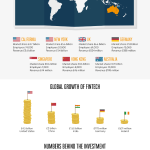More and more people are getting their higher education every year and while this is a positive thing, it can take a toll on your finances. After graduating, it is important that you approach financial planning in the first few years after college sensibly as this is what will set you up to make great financial habits later in life. As soon as you graduate, you need to come up with a strategy and plan that will set you up for financial freedom and you can do this by following our top tips below.
Start Saving
After graduating, the first thing that you will be looking to do is get a good graduate job. However, many people make the mistake of taking any graduate job that they can find, rather than the one that will be the right fit for them and in the field that they want to pursue. So, to escape from this daily grind, many people start to spend more money than they really should be. We’re not saying not to enjoy your newfound freedom but try to be sensible with your new income. Rather than splashing your first pay check on a huge fancy new television, why not instead compromise and buy a new television that maybe isn’t quite as expensive and then put the rest of the money away as savings for a rainy day.
If you had a student bank account, you should have a look at the other options your bank provides and consider opening a savings account instead.
Create Financial Security
While in college, most students will not have a lot of spare cash and so once a regular income starts to flow in, they see this as a sign of wealth. You will no longer have to eat the dorm food or snack on noodles and many graduates find themselves slipping into the habit of spending much more than they should on bars, clubs and restaurants.
What’s more, things like a fancy apartment and expensive holidays are an expense and once this money leaves your wallet, it’s gone and you will have nothing to show for it. Instead, you should be trying to save you money and invest in assets that are going to appreciate, rather than items that depreciate or are simply just an expense.
Get A Hold of Your Debt
As we previously mentioned, many graduates leave college with thousands, if not hundreds of thousands of pounds, in debt and then proceed to carry on with reckless spending. Getting yourself in debt will see your personal net worth take a dramatic hit. If you have debt from a bank account, make sure to pay this off first. You can then start to think about paying off your other student debt such as tuition fees. Set yourself a deadline and throw as much money as you possibly can at this debt to get rid of it and create financial freedom.
Improve Your Credit Risk
Not all debt is bad debt, such as a mortgage on a house. However, if you want to own your home someday, then you will need to establish a good credit history that will make your financially credible to lenders. This can be something as small as putting your car fuel costs on your credit card and then paying it off the following month.








